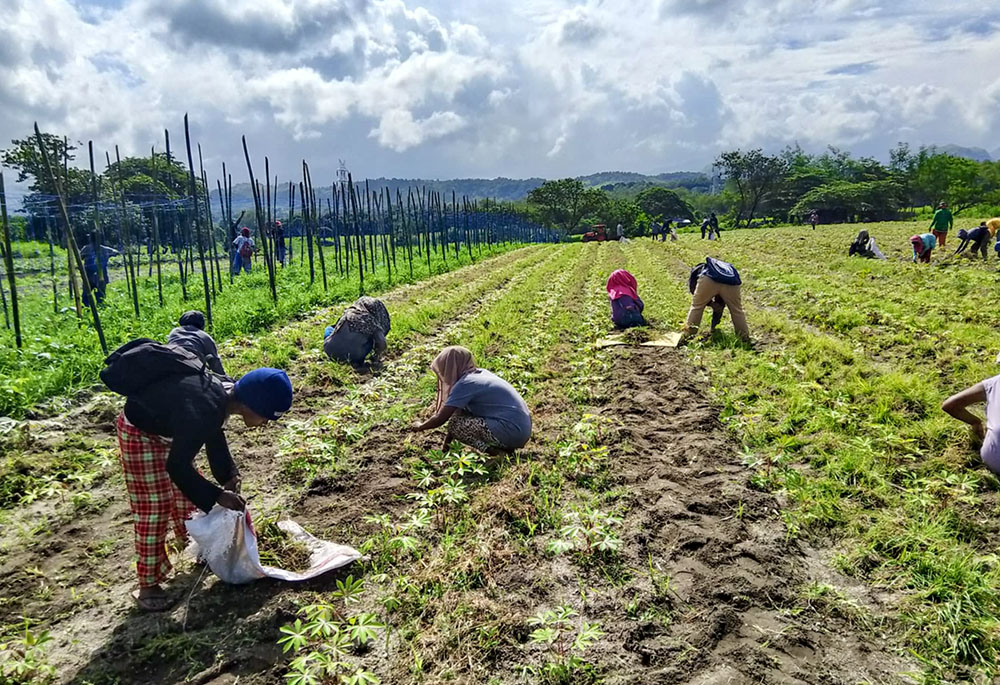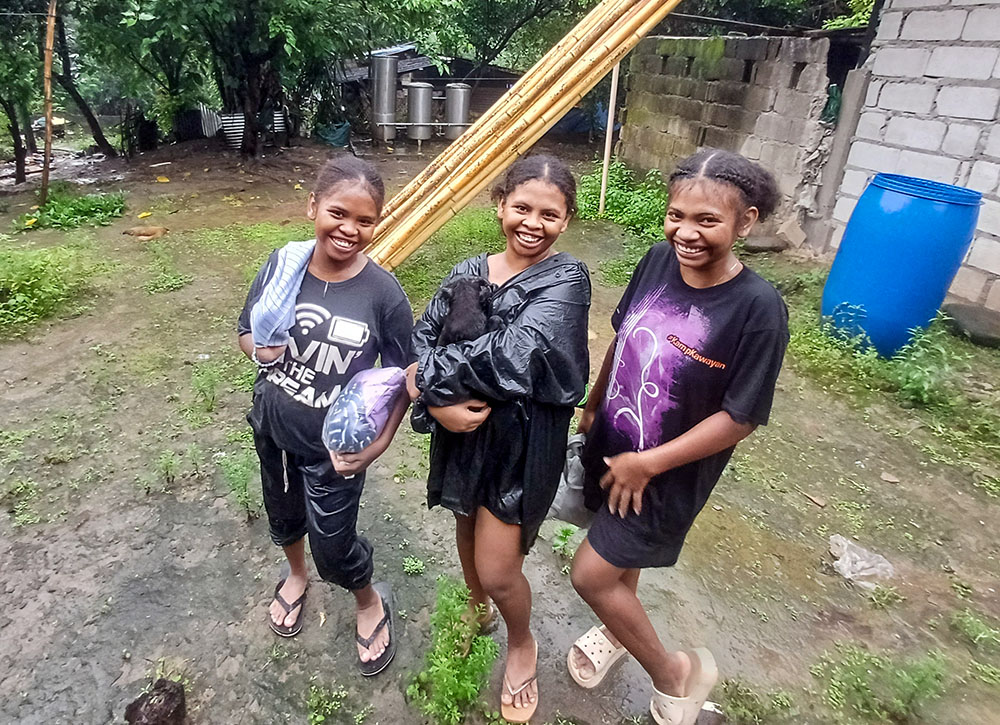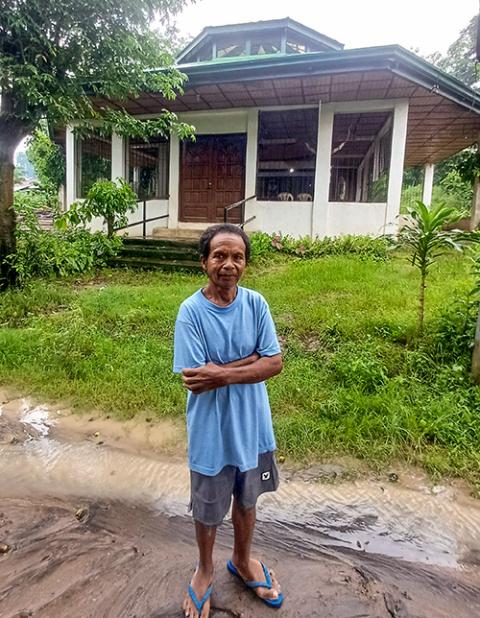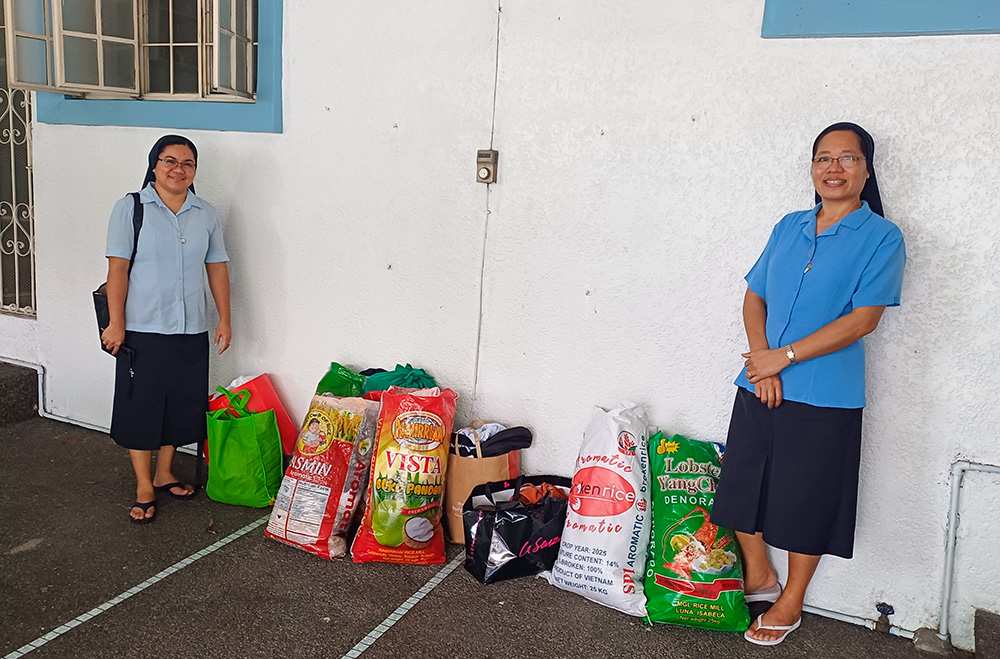
Aeta people work on their farm in Floridablanca, Pampanga, Philippines. (Ricardo M. Guiao)
On the slopes of Mount Pinatubo, an active stratovolcano in the mountainous region of Luzon, Philippines, the Aeta people typically pray to Apo Namalyari, a god they believe inhabits the volcano. This Indigenous community lives deep behind the Philippine Air Force's Cesar Basa Air Base, built by the U.S. Army before World War II.
In 1991, Mount Pinatubo erupted, killing more than 800 and affecting more than 1 million people. About 35,000 Aetas were displaced by the eruption, which is believed to be the second-largest in the 20th century, sinking churches, houses, crops and livestock in the violent mudflow and debris.
In 2022, sisters of the Adorers of the Blood of Christ, in collaboration with St. Vincent School of Theology, traveled more than 90 kilometers from Quezon City for outreach to the Aeta community. Now, three years later, the nuns' relationship with the Aeta people has grown, offering education and assistance in expanding the community's farming businesses.
The sisters' first meeting was not about faith, but a medical mission, said Sr. Linlee Vios, vocation director of the congregation. The medical mission in the Aeta community, still in conjunction with St. Vincent School of Theology, has been conducted monthly after the first outreach, she told Global Sisters Report.
The nuns also help the community sell their crops, Vios said at the convent inside a gated subdivision in Quezon City. The vegetables are popular with the community because they are produced by Aeta farmers.

Young Aetas of Sitio Camachile in Nabuclod, Floridablanca, Pampanga, the Philippines, head home from a farm on a rainy afternoon. (Oliver Samson)
"The medical mission and helping them sell their crops have been our regular assistance to them," Vios said.
"Each family has a house that stands on a spacious land," Sr. Flor Montojo Manga, mission coordinator of the congregation in the Philippines, said. "So, their homes are far apart from one another. Aside from the residential land, they have a separate vast land they communally own on which they plant their crops. Each Aeta farmer sells what he produces on their communal ancestral land."
The land for growing crops is about a kilometer from the community and is not accessible to vehicles, said Junior Mercado, a 58-year-old Aeta.
"Our main livelihood is planting crops like bananas, sweet potatoes, ampalayas, eggplants and long beans," Mercado said. "We borrow capital for the expenses in our productions."
The Aetas also sell their crops in Floridablanca, Pampanga, more than 10 kilometers from the community. At times, vegetable dealers climb to the mountain and buy the crops directly from the community.
Advertisement
The Aeta farmers are in transition to self-management of the financial assistance for their diversified farming, Manga said. Funds for their crop productions will be directly transmitted to them.
The Aetas work on the farm during the day, Vios said. At night and on weekends, they watch television and sing using a videoke set.
Three hundred families currently live in the Aeta community, said Manga.
"Most of them are Catholics," she said. "But some sects are recruiting them to their respective churches."
A Mass was celebrated in the community about one year after the nuns' first trip. The Mass in the Catholic chapel in the Aeta community is not regular, Manga added.
Some of the Aetas are members of born-again Christian churches such as Iglesia Ni Cristo and Seventh Day Adventist, said Mercado, a Catholic whose house is located near the chapel.
According to Mercado, Apo Namalyari inhabits Mount Pinatubo and has created everything.

Junior Mercado, a member of the Aeta community, stands in front of the Catholic chapel near his home. (Oliver Samson)
"Apo Namalyari is not mentioned in the Bible, but there is only one God," he said in Tagalog. "He and the God of Christians are only one."
Ricardo M. Guiao, the leader of the community, told GSR that there are times of worship for Apo Namalyari.
"For example, when there is a new harvest, someone in the family is sick, and we start cleaning the farm," he said. "There is an old woman who communicates with spirits and Apo Namalyari."
The Aetas also get married today under Catholic rites, Manga said.
"They get married at younger ages," she told GSR. "In their culture, the parents get their children married when they see them together even if they are not boyfriends and girlfriends."
Many women get pregnant at a younger age as a result, Manga said.
"So, when we began visiting their community, our OB-GYN doctor took care of them," she said. "At times, the pregnant women are checked by ultrasound."
The congregation has been running a medical center for the economically challenged in Quezon City for the past 30 years. It has volunteer doctors and a pharmacy that offers medicine at cheaper prices.
Long before the eruption, the Aetas were thriving in their community, said Mercado, who speaks Mag-Indi, one of the Aeta languages. After being displaced, the community was caught in the tension arising from the armed conflict between the government and the New People's Army. The rebels have been fighting government troops since members of the Communist Party of the Philippines founded the New People's Army in 1969. They seek to seize government power and establish what they call a national democratic government and later transition to socialism.
"Fortunately, we were relocated by the government back to our community later," Mercado said. "Some unat [straight-haired] people worked here. Roads and bridges were constructed."

Sr. Flor Montojo Manga, left, and Sr. Linlee Vios flank sacks of donated clothes for the Aetas. (Oliver Samson)
The sisters also monitor other needs of the community.
"Some of our assistance for Aetas depends on the season," Manga said. "But most of the year, we bring clothes, slippers, toys, food, stuff they request, and any donations that arrive in the convent."
The number of educated Aetas is growing, she said. The Aetas go to an elementary school and a high school in the barangay, or district, that covers their community. The community has already produced teachers and social workers.
The congregation has also trained six Aeta women who serve as health workers in their community, Vios said. They are trained on vital signs, interviewing patients and the treatment of common diseases.
The sisters hope to also address the issue of a clean water supply for each house in the Aeta community. The Aetas go to a tank to fetch water. The sisters are praying charitable individuals and groups will help the Aetas upgrade their water supply system.







